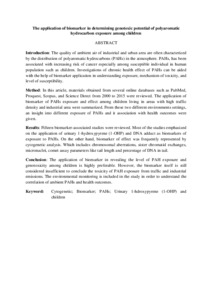Citation
Sopian, Nor Ashikin and Jalaludin, Juliana
(2017)
The application of biomarker in determining genotoxic potential of polyaromatic hydrocarbon exposure among children.
Annals of Tropical Medicine and Public Health, 10 (3).
533 - 543.
ISSN 1755-6783, ESSN: 0974-6005
Abstract
Introduction: The quality of ambient air of industrial and urban area are often characterized by the distribution of polyaromatic hydrocarbons (PAHs) in the atmosphere. PAHs, has been associated with increasing risk of cancer especially among susceptible individual in human population such as children. Investigations of chronic health effect of PAHs can be aided with the help of biomarker application in understanding exposure, mechanism of toxicity, and level of susceptibility.
Method: In this article, materials obtained from several online databases such as PubMed, Proquest, Scopus, and Science Direct from 2000 to 2015 were reviewed. The application of biomarker of PAHs exposure and effect among children living in areas with high traffic density and industrial area were summarized. From these two different environments settings, an insight into different exposure of PAHs and it association with health outcomes were given.
Results: Fifteen biomarker-associated studies were reviewed. Most of the studies emphasized on the application of urinary 1-hydroxypyrene (1-OHP) and DNA adduct as biomarkers of exposure to PAHs. On the other hand, biomarker of effect was frequently represented by cytogenetic analysis. Which includes chromosomal aberrations, sister chromatid exchanges, micronuclei, comet assay parameters like tail length and percentage of DNA in tail.
Conclusion: The application of biomarker in revealing the level of PAH exposure and genotoxicity among children is highly preferable. However, the biomarker itself is still considered insufficient to conclude the toxicity of PAH exposure from traffic and industrial emissions. The environmental monitoring is included in the study in order to understand the correlation of ambient PAHs and health outcomes.
Download File
![[img]](http://psasir.upm.edu.my/63404/1.hassmallThumbnailVersion/The%20application%20of%20biomarker%20in%20determining%20genotoxic%20potential%20of%20polyaromatic%20hydrocarbon%20exposure%20among%20children.pdf)  Preview |
|
Text (Abstract)
The application of biomarker in determining genotoxic potential of polyaromatic hydrocarbon exposure among children.pdf
Download (6kB)
| Preview
|
|
Additional Metadata
Actions (login required)
 |
View Item |

